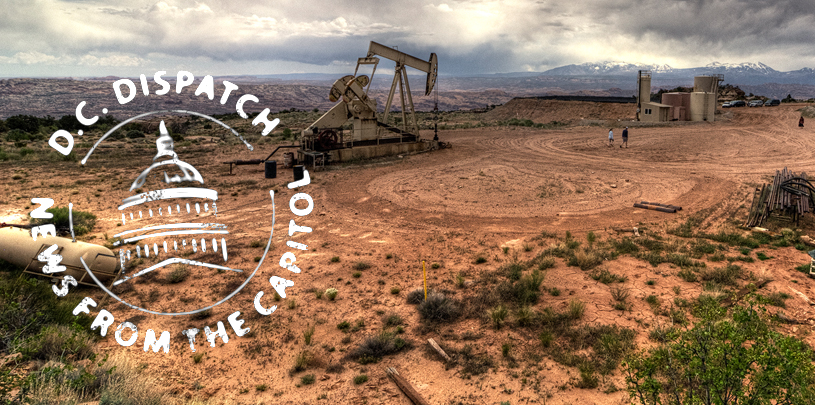
 by Mary O'Brien, Utah Forests Director
by Mary O'Brien, Utah Forests Director
For 50 years, the National Environmental Policy Act (NEPA) has guaranteed citizens like you and me a voice in federal decisions that could affect our communities and our environment.
On January 10, 2020, your federal government published a 192-page plan describing how it intends to gut America’s bedrock environmental law and cut you out of the equation.
This plan would largely exclude the public from weighing in on or suggesting alternatives to federal projects, from building oil and gas pipelines, to clearcutting old-growth forests, to turning your beloved public lands into pastures for cows by seeding non-native grasses, to constructing roads or highways. This last one is especially ironic, since NEPA was born in no small part out of public outrage that urban communities of color were learning they were in the path of highway-construction bulldozers only after the decisions had already been made. The Senate passed NEPA by unanimous vote in 1969. It became law in 1970. The current NEPA regulations place democracy and facts first.
The public now has 60 days to comment on this plan, before we lose critical NEPA provisions that give us a voice in federal actions that impact our environment.
While there are too many things wrong with the proposal to describe here, the plan includes four troubling rollbacks:
Currently, NEPA requires federal agencies to consider the cumulative impacts of projects. This ensures that climate change impacts that result cannot be ignored and that a project can’t simply be chopped up into a bunch of smaller projects to disguise the combined impacts.
Recently, the Bureau of Land Management (BLM) Interior Board of Land Appeals nixed a project to remove over 30,000 acres of pinyon and juniper forest from Grand Staircase-Escalante National Monument in Utah. The board found that the BLM had not considered the cumulative impacts of that project on birds, including the pinyon jay, given plans to similarly remove over 100,000 acres of pinyon and juniper trees elsewhere in the monument.
If the changes to NEPA go ahead, such a decision wouldn’t be possible. The agency could look only at the individual project, not at what is happening around it. An agency approving expansion of a coal mine or construction of a tar sands pipeline would not need to consider how the emissions it would make possible would contribute to the climate crisis.
2. Private companies would be able to write the NEPA analysis for their own projects.
The proposed regulations would allow private companies not only to propose projects, like expanding a mine, but also to write the NEPA analysis of that project, including summarizing the project’s expected environmental impacts. We know how candid those analyses would be.
3. Technical requirements would make it difficult for an average citizen to make his or her voice heard.
Under the proposed changes to NEPA regulations, if you want to comment on any of the very few projects for which public comment would still be possible, you would be required to explain why the issue is significant to the agency’s analysis of environmental impacts, and what the economic and employment impacts would be. Plus, you’d have to describe your data sources and methodologies supporting any changes you propose. What is the message here for low-income, urban communities facing construction of a hazardous-waste dump, or a new highway through their neighborhood? Remember how NEPA was born?
4. Invitation to agencies to ditch NEPA.
Currently only one federal agency, the Environmental Protection Agency, is exempt from NEPA for certain procedures, such as registering pesticides. Because of this exemption from NEPA processes, it does not have to consider or compare the new pesticide to safer alternatives. The 2020 proposed NEPA regulations invite agencies to either use their own distinct procedures instead of NEPA, or to claim that Congress “intended” that their procedures are functionally equivalent to NEPA. Those procedures, while having to “consider” environmental issues and include public participation, would almost certainly be a shortcut, allowing federal agencies to sidestep America’s most important environmental law.
It’s time to stand up for your right to defend your community, climate, drinking water, national forests, and other public lands from fast-tracked, non-scientific, private-interest decisions to cut, pave, burn, extract, mine, pipe, emit, graze, and generally degrade whatever site has caught the eye of a developer, industry, political appointee, or politician. If you think I might be exaggerating, read the proposal to erase your voice. Or read this informative short piece by one of NEPA’s most stalwart practitioners and defenders.
Proposal to build massive communications tower on state lands inside Bears Ears National Monument withdrawn
Read MoreThe Navajo Nation and communities along the haul route oppose uranium transport from Grand Canyon region mine.
Read MoreDeveloper's attempt to dam a canyon near the confluence of the Colorado and Little Colorado rivers halted.
Read More